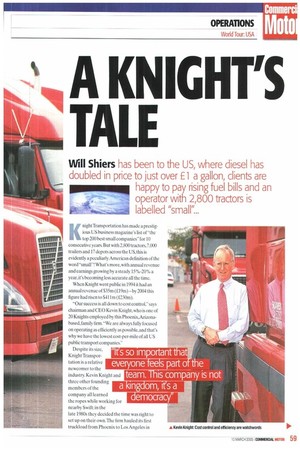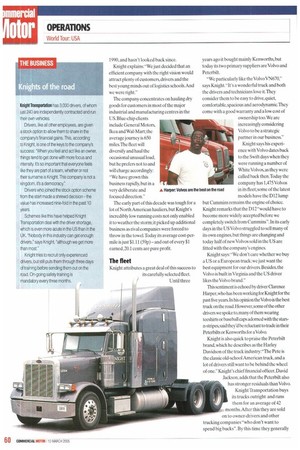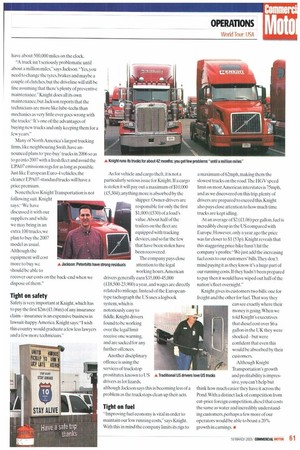KNIGHT'S TALE
Page 59

Page 60

Page 61

If you've noticed an error in this article please click here to report it so we can fix it.
Will Shiers has been to the US, where diesel has doubted in price to just over 1 a gallon, clients are happy to pay rising fuel bills and an operator with 2,800 tractors is labelled "small"...
I s so important t a everyone ee s part o the a ingsom,t s a emocra
Knight Transportation has made a prestigious US business magazine's list of "the top 200 best small companies" for 10 consecutive years. But with 2.800 tractors, 7,000 trailers and 17 depots across the US, this is evidently a peculiarly American definition of the word "small"! What's more, with annual revenue and earnings growing by a steady 15 %-20% a year, it's becoming less accurate all the time.
When Knight went public in 1994 it had an annual revenue of $35m (£19m)— by 2004 this figure had risen to $411 m (£230m).
"Our success is all down to cost control," says chairman and CEO Kevin Knight, who is one of 20 Knights employed by this Phoenix,Arizonabased, family firm.-We are always fully focused on operating as efficiently as possible, and that's why we have the lowest cost-per-mile of all US public transport companies."
Despite its size, Knight Transportation is a relative newcomer to the industry. Kevin Knight and three other founding members of the company all learned the ropes while working for nearby Swift: in the late 1980s they decided the time was right to set up on their own.The firm hauled its first truckload from Phoenix to Los Angeles in 1990, and hasn't looked back since.
Knight explains:"We just decided that an efficient company with the right vision would attract plenty of customers, drivers and the best young minds out of logistics schools. And we were right."
The early part of this decade was tough for a lot of North American hauliers, but Knight's incredibly low running costs not only enabled it to weather the storm; it picked up additional business as rival companies were forced to throw in the towel. Today its average cost-permile is just $1.11 (59p) —and out of every $1 eamed,20.1 cents are pure profit.
The fleet
Knight attributes a great deal of this success to its carefully selected fleet. years ago it bought mainly Kenworths, but today its two primary suppliers are Volvo and Peterbilt.
"We particularly like the Volvo VN670," says Knight."It's a wonderful truck and both the drivers and technicians love it.They consider them to be easy to drive,quiet, comfortable, spacious and aerodynarnic.They come with a good warranty and a low cost of ownership too. We are increasingly considering Volvo to be a strategic partner in our business."
Knight says his experience with Volvo dates back to the Swift days when they were running a number of White Volvos, as they were called hack then. Today the company has 1,475 Volvos in its fleet; some of the latest models have the D12 lump but Cummins remains the engine of choice. Knight remarks that the D12 "would have to become more widely accepted before we completely switch from Cummins". In its early days in the US Volvo struggled to sell many of its own engines,but things are changing and today half of new Volvos sold in the US are fitted with the company's engines.
Knight says: -We don't care whether we buy a US or a European truck; we just want the best equipment for our drivers. Besides, the Volvo is built in Virginia and the US driver likes the Volvo brand."
This sentiment is echoed by driver Clarence Harper,who has been working for Knight for the past five years. In his opinion the Volvo is the best truck on the road. However,some of the other drivers we spoke to, many of them wearing teeshirts or baseball caps adorned with the starsn-stripes,said they'd be reluctant to trade in their Peterbilts or Kenworths for aVolvo.
Knight is also quick to praise the Peterbilt brand, which he describes as the Harley Davidson of the truck industry:"The Pete is the classic old-school American truck, and a lot of drivers still want to be behind the wheel of one." Knight's chief financial officer, David Jackson, adds that the Peterbilt also has stronger residuals than Volvo.
Knight Transportation buys its trucks outright and runs them for an average of 42 months. After this they are sold on to owner-drivers and other trucking companies "who don't want to spend big bucks". By this time they generally have about 500,000 miles on the clock.
"A truck isn't seriously problematic until about a million miles," says Jackson, "Yes, you need to change the tyres, brakes and maybe a couple of clutches, but the driveline will still be fine assuming that there's plenty of preventive maintenance." Knight does all its own maintenance, but Jackson reports that the technicians are more like lube-techs than mechanics as very little ever goes wrong with the trucks:"It's one of the advantages of buying new trucks and only keeping them for a few years."
Many of North America's largest trucking firms, like neighbouring Swift. have announced plans to 'pre-buy' trucks in 2006 so as to go into 2007 with a fresh fleet and avoid the EPA07 emissions regs for as long as possible. Just like European Euro-4 vehicles, the cleaner EPA07-standard trucks will have a price premium.
Nonetheless Knight Transportation is not following suit. Knight says: We have discussed it with our suppliers and while we may bring in an extra 100 trucks, we plan to buy the 2007 model as usual. Although the equipment will cost more to buy we should be able to recover our costs on the back-end when we dispose of them." A Jackson: Peterbilts have strong residuals Tight on safety
Safety is very important at Knight, which has to pay the first $2m (£1.06m) of any insurance claim — insurance is an expensive business in lawsuit-happy America. Knight says:"I wish this country would graduate a few less lawyers and a few more technicians." As for vehicle and cargo theft, it is not a particularly serious issue for Knight. If a cargo is stolen it will pay out a maximum of $10,000 (£5,304); anything more is absorbed by the shipper. Owner-drivers are responsible for only the first $1,000 (£530) of a load's value.About half of the trailers on the fleet are equipped with tracking devices, and so far the few that have been stolen have been recovered.
The company pays close attention to the legal working hours. American drivers generally earn $35,000-45,000 (£18,500-23,900) a year, and wages are directly related to mileage. Instead of the Europeantype tachograph the US uses a logbook system, which is notoriously easy to fiddle. Knight drivers found to be working over the legal limit receive one warning, and are sacked for any further offences.
Another disciplinary offence is using the services of truckstop prostitutes, known to US drivers as lot lizards, although Jackson says this is becoming less of a problem as the truckstops clean up their acts. A Traditional US drivers love US trucks Tight on fuel Improving fuel economy is vital in order to maintain our low running costs," says Knight. With this in mind the company limits its rigs to a maximum of 62mph,making them the slowest trucks on the road.The IIGV speed limit on most American interstates is 75mph, and as we discovered on this trip, plenty of drivers are prepared to exceed this. Knight also pays close attention to how much time trucks are kept idling. At an average of $2 (11. .06) per gallon, fuel is incredibly cheap in the US compared with Europe. However, only a year ago the price was far closer to $1 (53p). Knight reveals that this staggering price hike hasn't hit the company's profits: "We just add the increasing fuel costs to our customers' bills.They don't mind paying it as they know it's a huge part of our running costs. If they hadn't been prepared to pay then it would have wiped out half of the nation's fleet overnight."
Knight gives its customers two bills: one for freight and the other for fuel.That way they can see exactly where their money is going. When we told Knight's executives that diesel cost over $6 a gallon in the UK they were shocked— hut were confident that even this would be absorbed by their customers.
Although Knight Transportation's growth and profitability is impressive,you can't help but think how much easier they have it across the Pond.With a distinct lack of competition from cut-price foreign competition, diesel that costs the same as water and incredibly understanding customers, perhaps a few more of our operators would he able to boast a 20% growth in earnings. •










































































































































































































